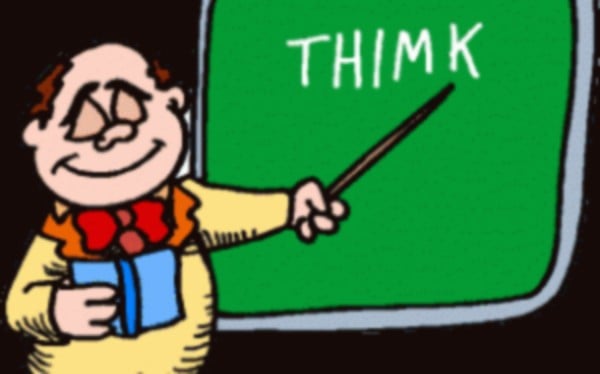

There is something with English language, or maybe something with Pakistanis. At any rate, neither makes the other feel and sound good, to put it mildly.
There is a sizeable population of middle class youth in every little city that has seen the inside of a college and is English-literate enough to read and write text messages on their Chinese mobile phones. Their big city cousins can read large-print romantic novels and get to watch English-language films -- mostly action and pornography -- that do not require dialogue. Both sets grow up with a very limited vocabulary, a very large ego, and having never spoken with or heard a native speaker. They understand English through images, imagination, and badly spelled and pronounced words.
Everyone knows what’s ‘boom boom’ or ‘bom bom’ when it’s used as a prefix to Afridi in a cricket stadium, or in the Nazia Hasan number Dil bolay boom boom. But try asking around the meaning of ‘boom boom’ and the number of answers you get may be, as the Urdu saying goes, the same as the number of mouths that uttered them.
There is nothing wrong with English as long as it is used by people who wish to speak it and are able to understand it. In Pakistan, very few wish to speak English; even fewer make an effort to learn it; and fewer still develop a reasonable proficiency in it, because our education system is largely dependent on regional languages and a majority of our teachers can barely speak proper Urdu, let alone a foreign language. Little wonder that English is the subject students across Pakistan flunk the most in every board examination. Those who pass, do so through rote rather than understanding.
Those who are really good at the language immediately or eventually leave country or find an air-conditioned job working with foreigners in Islamabad and Lahore. Those who can’t find a proper job on merit, pay the local tout money to get appointed as a teacher. This person is no stranger; nine out of ten among you have been taught English by this gentleman or lady.
You obviously think you are the tenth. This is how you become a journalist by memorising 500 words that will last you your entire career, or a bureaucrat who can’t construct a sentence without consulting old correspondence on the subject and without putting in it wishful phrases and meaningless words like ‘competent authority’ and ‘whereof’. Or a parliamentarian who, as befits the representative of an illiterate people, is illiterate or semi-literate at best, but has to take oath as an MPA, and after that legislate, in English. Or a soldier who uses a one-sentence template to say pretty much all there is to say for a soldier: ‘If you bloody well do -- I’ll shove my bloody -- in your bloody --’.
Teacher is the key to ensure English remains as much a mystery to the next generations as it has been to him or her. While working on an education-related project in urban Lahore and suburban Multan, I came across hundreds of teachers -- new, senior and very senior. They all pronounced faculty as ‘facality’. While searching the net for analyses of the education sector, I saw dissertations and research papers by expert educationists that read like a sheet on which someone has been practicing typing. Here is a gem I am reproducing verbatim from a paper written by to Pakistani professors:
"Abstract: Education sector is undergoing through a crises situation in most of developing countries including Pakistan…"
Abstract? The right word is ‘absurd’. I haven’t read a more pathetic, presumptuous, uneducated and grammatically scandalous first line, ever. And all this in a 15-word sentence. This from two scholars of one of the oldest and prestigious universities in Pakistan.
In conclusion, which may first appear to be too simplistic, education is not the biggest problem of Pakistan; English language and those teaching it, are. If English is to stay, the entire lot of English teachers will have to retrain as farmers, tradesmen, or journalists to make room for younger and more qualified teachers who have command over language as well as literature and culture associated with a foreign language. And if the current lot of teachers is to stay, English will have to go.
As long as we have both, nothing will ever get done in this country because we are trying to do it in a language we just don’t get.